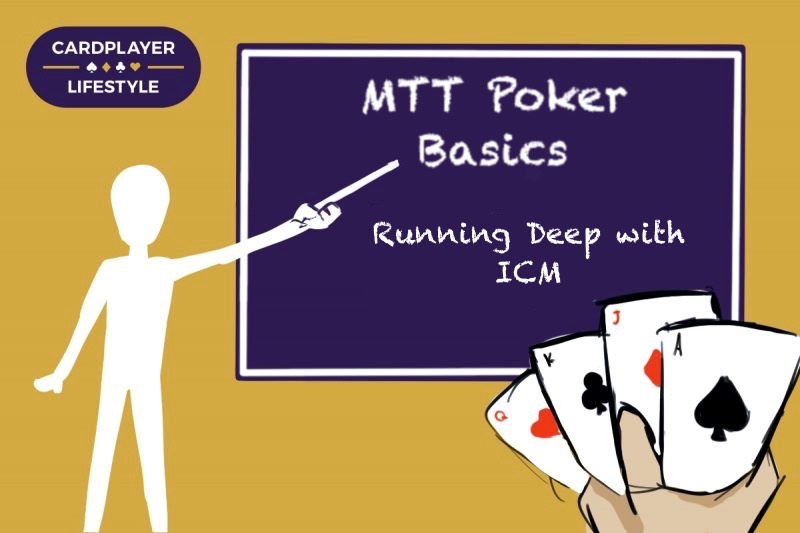Ed. note: This is the ninth in a series of articles designed to help recreational tournament poker players build their hobby into a profitable endeavor.
In tournament poker, the Independent Chip Model (ICM) is the name of the game. It is the number one reason why tournaments differ from cash play, and if you don’t make the proper adjustments, you may be throwing away your chances at earning the top prizes.
In this article, we will examine what ICM is, when it matters most, and how you should adjust your play to accommodate these factors.

What is ICM?
The Independent Chip Model (ICM) is a mathematical model used to approximate a player’s equity in a tournament by converting chip stacks into an estimated share of the prize pool. It calculates the expected value of each player’s stack based on the likelihood of finishing in each payout position, given the remaining players and their chip stacks.
This would involve lots of math for you to literally calculate on paper, but that actually isn’t necessary. You can use general principles to think about ICM more as an ever present factor in tournament poker. Paying attention to where you stand within the field and how to weaponize your stack effectively will work just as well to avoid committing ICM suicide.
When does ICM matter most?
ICM is arguably a factor from the first hand of the tournament. But there are key periods of play when you should be most aware of the ICM dynamics and how they impact decisions.
ICM becomes particularly important during:
- The Money Bubble: The stage where the tournament is one or very few players away from paying out the remaining players. The value of a player’s stack is significantly impacted by the prospect of moving from no cash to a min-cash.
- The Final Table Bubble: Just before the final table, when pay jumps become more substantial with each player that is eliminated. There should be immense pressure to avoid busting and reach the final table where the vast majority of the prize pool is won.
ICM is most important during the overall money bubble, followed by the Final Table bubble.
Keep in mind that the money bubble may mean different things to different players. If a min cash of 1.5x the buy in is not significant to you, you may feel less handcuffed by ICM than if it were a full 2x min cash. But ultimately, your return on investment will never increase more than going from $0 to earning a return. That ROI is always worth respecting.
After the money bubble bursts, tournaments slowly increase pay jumps slowly until the Final Table bubble when payouts start to increase significantly. This is where tournament players make their living. Cashing a tournament is good, but when you sift through all the variance and tournaments played, it is a player’s performance just before and during the final table that will determine their upside in the long run.
Adjustments Based on ICM
ICM will influence decisions based on your stack size, position, and the size of the other stacks at the table. Here are simple strategies to keep in mind for each stack size as you navigate toward the top prizes.
Short Stack (12bb or less):
- General Strategy: With 12bb, you typically have some fold equity. You should be more aggressive with shoves and min-raise less often. Shoving medium pocket pairs, suited high cards, and strong hands is best to dissuade players from outdrawing you.
- ICM Considerations: On the money or final table bubble, being aware of even shorter stacks (5-6bb) can affect your strategy. You might opt to fold medium strength hands that work fine as shoves in favor of allowing shorter stacks to potentially bust before you.
Average Stack:
- General Strategy: Play tighter and avoid unnecessary risks. Your goal is to advance to the next stage of the tournament without jeopardizing your current position. With a middle stack, you need to be cautious about risking your chips when shorter stacks are likely to bust, thereby increasing your chance of advancing and receiving a pay jump.
- ICM Considerations: With this stack depth, you may have to fold solid hands to bigger stacks applying intense pressure. When you do move your chips in with a medium stack, be sure it is with a hand strong enough to justify the risk.
Major Chip Leader:
- General Strategy: If you have a significant chip advantage over other players, you can leverage your stack to apply pressure. You can widen your range, 3-bet with high card blockers, and force opponents into difficult decisions.
- ICM Considerations: Use your stack to pressure others, especially those who are close to the money or final table bubbles. This can induce folds and allow you to increase your stack further while others wait out the ICM pressure.
Bottom line: be cautious
In the end, your number one takeaway from having read this poker strategy article should be that in certain stages of a tournament, you must be more cautious. When ICM pressure is significant, big bets often become small bets, small bets become checks, etc.
You will need to be higher in your range to start fighting back against your opponents for all of the chips. Even if your opponents are still playing loose, it may be even more reason to take your foot off the gas. There is no reason to risk your tournament on a high variance spot if your opponents are still too far out of line.
Ultimately, ICM may grind tournament play to a crawl. But it is an essential consideration if you aim to cash and win tournaments consistently. Keep these basics in mind and you will find yourself with the chance to win the biggest prizes more consistently.






